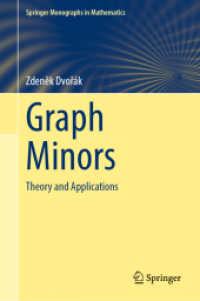Full Description
This book investigates the penal culture in France and Germany - how it is shaped in politics, media, and public opinion. Although compared with the US or the UK, France and Germany seem to place a strong emphasis on the ideal of rehabilitation that would block excessive punishment and other outcomes of punitive developments in society, there is a steady increase in punitiveness over time for which the term "strained restraint" is proposed. The book shows that the idea of penal moderation is deeply rooted in public opinion, politics, and the media and that it is renegotiated every day in a dynamic interplay between these spheres.
Punishment and society research has traditionally focused on the US and the UK. In comparative research, both are considered extreme in punitive developments with high rates of imprisonment and large groups of the population under penal control. The other extreme in comparative research would be Scandinavia with the famous Nordic Exceptionalism marked by low prison population rates. Germany and France are often considered to be "the same" when compared with each other, and "the other" with reference to both of these extremes. However, this book shows that France and Germany are far from being the same when it comes to state organization (centralistic vs. federal), criminal justice and the criminal law, political traditions, and the media. Also, research from both countries has looked at whether developments such as the "punitive turn" have occurred in Germany and France. Research focused on the domestic situation concludes that punitiveness is on the rise, and that both countries are indeed experiencing their own punitive turn.
How do we reconcile these contradictory findings? Why do these two seem to follow the path of penal moderation in the overall outcome of punishment in society when we look at comparative research? And how is it that from a domestic perspective, punitive attitudes and desires are leading to more punitiveness? By focusing on the meso level, with a comparative perspective on the two countries and a dynamic analytical approach, this book reconciles the fluidity of individual attitudes and opinions with the relative stability of societal discourse. The authors posit that penal moderation comes at a price: overall and in an internationally comparative perspective, there is penal moderation, but a closer look at the domestic situation and development reveals that it is nonetheless challenged by a slowly rising tide of punitiveness.
Going beyond the main tenets of punishment and society research with a dynamic analysis of two large societies in Europe, this book is ideal reading for scholars and students of penology, criminal justice, and European studies.
Contents
Part One: Points of Departure 1.Testing the Continental Restraint Hypothesis in France and Germany Kirstin Drenkhahn, Fabien Jobard, Johanna Nickels and Tobias Singelnstein 2.A Testament to Penal Moderation? Key Aspects of the Criminal Sanctions Law and Procedure Law in France and Germany Kirstin Drenkhahn, Anna Maria Makowka and Johanna Nickels 3.Criminal Justice in Numbers Kirstin Drenkhahn, Fabien Jobard and Shaïn Morisse Part Two: Punishment in Society in France and Germany 4.How we did it - Methods Fabien Jobard, Nicolas Hubé, Bénédicte Laumond, Shaïn Morisse, Johanna Nickels and Claire Ruffio 5.Punishment and the Population 5.1.What Would You Do? Decisions By French and German Judges and Laypeople on Sanctions for Everyday Delinquency Fabien Jobard 5.2 Laypersons and their Penal Rationalities: A Card Game to Shed Light on the Penal Demand of the French and German Populations Bénédicte Laumond 6.Politics and Punishment 6.1. Law-and-order Politics: The Ticket to Success for Political Actors? Bénédicte Laumond and Shaïn Morisse 6.2 Governing Crime in Parliament Bénédicte Laumond and Elena Zum-Bruch 6.3 Always More and Never Enough? An Analysis of Trends in Criminal Legislation in France and Germany Since 1995 Johanna Nickels 7.Punishment and the Media 7.1 The Mediated Construction of Crime Nicolas Hubé and Claire Ruffio 7.2 Tabloidization of News Rather Than Punitive Turn - Crime and Penal Issues on French and German Newspaper Front Pages (1971-2017) Nicolas Hubé and Claire Ruffio 7.3 Reporting on a "Politically Sensitive but Profitable" Issue - Field Logics and Individual Perceptions of Crime in France and Germany Claire Ruffio and Elena Zum-Bruch Part Three: Impending Challenges to Penal Moderation in France and Germany 8.A Strained Restraint - The Ambivalences of Penal Moderation in Germany and France Kirstin Drenkhahn, Fabien Jobard and Tobias Singelnstein








